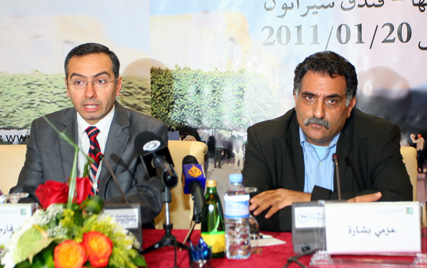 In a roundtable discussion organized by the Arab Center for Research and Policy Studies, Arab researchers and scholars discussed the background of the Tunisian popular revolution, and pondered its future and potential effects on the countries of the Arab Homeland.
In a roundtable discussion organized by the Arab Center for Research and Policy Studies, Arab researchers and scholars discussed the background of the Tunisian popular revolution, and pondered its future and potential effects on the countries of the Arab Homeland.
Summary
In the midst of the ongoing events in Tunisia, and following on the footsteps of its revolutionaries, the Arab Center for Research and Policy Studies (ACRPS) held its second symposium with the aim of fostering a deeper understanding of what has unfolded in Tunisia.
The conference explored the potential contribution of the events in fomenting an alternative future, seeking to read into this future, and its implications on the Arab Homeland, with the participation of select group of Tunisian scholars who came specifically from Tunisia - for a single day - to participate in the event, which could be dubbed as the first scholarly conference on "the popular revolution in Tunisia".
In his opening remarks, Dr. Azmi Bishara, director of ACRPS, identified a number of general characteristics to describe what went in Tunisia. Bishara decidedly asserted that it was a "popular revolution" because of its scale, its ability to last, and because it shifted into questioning the entire nature of the regime.
He also argued that the revolution had several roots, some of which were produced by the Tunisian regime itself.
The high literacy levels, for instance, contributed positively to social awareness; the homogeneity of the Tunisian society protected the revolution from morphing into a sectarian conflict instead of focusing on felling the regime. In addition to these factors, the Tunisians have a very rich legacy of syndical activism, and an opposition movement boasting numerous experiences and sacrifices. The ensemble of these factors forms the founding logic of the revolt.
Bishara then moved to survey some of the messages that can be gleamed from the revolution. Firstly, the revolt did not resort to violence, which means that Tunisia's parties - banned and legal - can agree on "rule of the game" for the next phase, which does not include violence.
Secondly, the revolt ushered shockwaves of terror towards Arab regimes that are frightened of the possibility of its replication. Therefore, we cannot exclude the possibility of these regimes laboring to subdue the revolution, which necessitates Arab popular solidarity to guarantee its success.
Thirdly, the revolt has shown that change in the Arab World is possible; if the Tunisian people possesses its own "geniality" that was apparent in the unique path it took in dethroning the previous regime, every Arab population also has its own specificities that foment forms of action that the people respect and interact with.
Furthermore, possibilities of change are entirely plausible given the degradation of the Arab situation, to the point where "ruling families" have emerged within republican regimes, and where the process of "political inheritance" has gone beyond individuals to include entire classes of elites (e.g., security, businessmen, ruling families, etc.).
Dr. Bishara also opined that transition to democracy requires the availability of two conditions: an analytic and cumulative attitude vis-à-vis the experience, and a nationally responsible ethical position.
Thus, the transition process can be facilitated through the agreement on "rules of the game" within a contractual representative system, which is usually ushered in after a period of chaos when the arrivistes pop to the surface.
Before passing the word to the researchers participating in the first session, which was devoted to explaining the events in Tunisia, the symposium's coordinator Dr. Fares Braizat, researcher at ACRPS, noted that the people's revolt in Tunisia ushers in a new era in the Arab Homeland, and should be seen as a seismic event because the Tunisian people's uprising provided a clear answer to a perennial question: how can the Arab street mobilize? He added that the revolution of the Tunisian people answered these questions positively, but left us with several questions that we need to ponder.
Dr. Fares closed his presentation by asking the crucial question: did the President fall, or did the regime fall?
Al-Sahbani: Ben Ali brought himself down when he monopolized the state and society
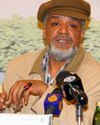 Dr. Abd al-Sattar al-Sahbani, professor at the University of Tunis, attempted to answer the key question: who fell in Tunisia, the President? Or the regime? Al-Sabhani posited that what occurred was that the President "took himself down" due to several factors, including his monopolization of both "state" and "society," unlike his predecessor who monopolized the "state/society".
Dr. Abd al-Sattar al-Sahbani, professor at the University of Tunis, attempted to answer the key question: who fell in Tunisia, the President? Or the regime? Al-Sabhani posited that what occurred was that the President "took himself down" due to several factors, including his monopolization of both "state" and "society," unlike his predecessor who monopolized the "state/society".
The difference between the two models is that Ben Ali's represented a complete monopolization of all the state structures, coupled with the absence of "safety valves," which set a strong foundation for the revolt. In addition to that, the Tunisian political body was built as a densely-layered pyramid with Ben Ali solely on top; with his fall, the structure would gradually unwind according to the tempo of the revolution and its demarche.
Al-Sahbani also asserted that Ben Ali fell due to four essential reasons: firstly, his inability to renew his discourse since his ascension to power in 1987. Second, his lack of an ideology, as he built upon a project of a populist society based on the concept of "solidarity," a concept that became a tool for institutional and political blackmail.
Third, the marginalization of the middle class; as we saw, the events began in areas that do not contain a middle-class, and the popular neighborhoods that mobilized had a paltry middle-class constituency.
Consequently, the absence of the middle class was an important factor in the progression of events. Lastly, Ben Ali fell because he did not allow a regeneration of the political class, whether within the cadres of his own regime, or even in the ranks of the opposition parties, which perpetuated their leaderships in keeping with the principle of political monopolization.
Conversely, the coming phase will witness an ending to this mode of monopolization and should lead to democracy because previous attempts did not involve this level of renewal.
Lutfi Zaytun: The Tunisian countryside made all the difference and enabled the revolution to succeed
 Researcher Lutfi Zaytun, ex-leader in the Nahda party, stressed the importance of historical experience, which is embedded in the heart of the Tunisian collectivity, in order to extract the elements that shaped the current picture.
Researcher Lutfi Zaytun, ex-leader in the Nahda party, stressed the importance of historical experience, which is embedded in the heart of the Tunisian collectivity, in order to extract the elements that shaped the current picture.
He argued that the lesson derived from comparing this revolution to previous uprisings is that the current revolt has succeeded because it originated in the countryside, as opposed to the previous urban protests which quickly died down.
This illustrates a pattern in Tunisian history whereby revolts led by the countryside produce practical results, unlike urban movements. We can take the 1864 revolt as an example; the movement was premised by the events of December 1857 when foreign fleets besieged the Bey and forced him to promulgate the Fundamental Pact (`Ahd al-Aman), an imposed Tunisian constitution which was written in one evening.
This narrative of the Tunisian Fundamental Pact has elicited disapproving responses from scholars; in fact, the Pact was similar to the current-day European Partnership, leading to a sharp industrial crisis that increased prices, and forcing farmers to burn his crops - just as Muhammad al-Bouazizi burned himself.
In conclusion, the main reason for the success of this revolution is in its emergence from the countryside, with massive numbers of college graduates who expressed their protests with the use of giant media outlets. Zaytun drew the scenario of the events: "after the revolution matured in the countryside, the cities mobilized and in Sfax, the first wholly political slogan demanding the ousting of Ben Ali was raised.
Subsequently, the political movements (the General Labor Union, the Lawyers' Syndicate) picked up the revolt, followed by the political parties which coordinated their claims, culminating with the demand to ouster the Constitutional Democratic Rally".
Session 2: Economic and Social Conditions in Tunisian Society
In the second session, the theme was the economic and social conditions of the Tunisian society. Dr. Abd al-Wahab al-Qassab (associate researcher, coordinator of the strategic program at ACRPS) presided over the session and three speakers presented: Mahdi Mabruk, Muhammad al-Nuri, and Shawqi al-Tabeeb.
Mahdi Mabruk: The Tunisian People have a Memory of Protest
 Mahdi Mabruk, professor in the sociology department at the University of Tunis, considered the revolution to be surprising in two respects: first, it did not feature ready-made ideologies that capture the mind of Tunisian society; there were hardly any ideological leanings to the revolution. Second, there were no leaders, or leaderships, imposing themselves on the revolution as a new dictatorship.
Mahdi Mabruk, professor in the sociology department at the University of Tunis, considered the revolution to be surprising in two respects: first, it did not feature ready-made ideologies that capture the mind of Tunisian society; there were hardly any ideological leanings to the revolution. Second, there were no leaders, or leaderships, imposing themselves on the revolution as a new dictatorship.
Regarding the social context of the region that saw the flaring of the revolt, Mabruk noted that Sidi Bouzid lies in a central location, bordered by six governorates and representing 4.6 % of Tunisia's landmass. 64 % of its area is covered by agricultural lands, with a population estimated at 395,000 in 2004, rising to 400,000 in 2007.
Rural lifestyle dominates the governorate, which has a particularly difficult climate and lacks urban infrastructure. In other terms, it is the least urbanized and the least favored governorate, given that the entire Tunisian hinterland receives 16.8 % of the developmental budget, while the coastal regions receive 82.2 %.
Consequently, Sidi Bouzid registers the lowest standard of living in Tunisia, with 75.5 % of the population employed in agriculture, which does not provide large revenues. At the same time, Sidi Bouzid boasts the lowest unemployment rate at 9.5%.
The region is also distinguished by a strong family unit and familial solidarity that, doubtless, played an important role in the perseverance of the protests.
The speaker stressed the rural origins of the revolution, in contrast with the 1984 bread uprising, when the backbone was decidedly urban. He also noted that several very important forms of protests had been occurring in Tunisia, including youth demonstrations, especially in soccer stadiums; in fact, the root of the protests can be traced back to the stadiums, Mabruk asserted.
The scholar opined that the political regime lost all links to society due to the repression of civil liberties and the press, as well as human rights abuses. Accusations of terrorism and treason were often the excuse invoked to repress freedoms and demands.
The regime fervently sought an alternative to fill this gap, but was incapable of doing so, and the problem dove-tailed with the escalation of the problem of college graduates who started suffering mass unemployment beginning in the late 1990s. The events flared up after the suicide cases due to the widespread economic vulnerability and the surge in economic protests.
Muhammad al-Nuri: Corruption and wayward development, the environment of the revolution
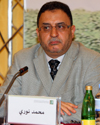 If social factors provide easy explanations for the transformation in Tunisia, economic ones are more difficult to analyze due to the glittering image that has been promoted in the Tunisian economy.
If social factors provide easy explanations for the transformation in Tunisia, economic ones are more difficult to analyze due to the glittering image that has been promoted in the Tunisian economy.
In his presentation, researcher Muhammad al-Nuri, professor of Islamic economy and Islamic finance at the European Institute for Human Sciences - Paris, has attempted to read into these factors, which he summed up into a matrix consisting of unemployment-corruption-uneven development.
The speaker briefly discussed unemployment, noting its threat on societies, especially among the youth and the educated. Regarding financial corruption, he asserted that it was always linked to the ruling family, but its scale has increased over the last years, and Wikileaks has presented grave documents showing the extent of the ruling family's corruption.
Successive corruption scandals have scared off investors and tainted the Tunisian investment environment with a lack of confidence. In the third plane comes the paradox of uneven development: Tunisia scored high in international reports, earning the country a leading position among Arab and African countries in the field of development.
The researcher noted that achievements have indeed been made, but that the problem lay in the developmental model which had reached its limits and was becoming counter-productive.
Development took place, but it was uneven, socially and geographically, with a focus on vulnerable sectors, such as services and tourism, while agriculture shrank as a percentage of GDP from 54% to 16%, with industry contributing 36% and services 48%. Tourism and services are sectors that do not provide lasting and stable job opportunities, nor do they satisfy the needs of society. This had led to an imbalance between sectors and classes, and to the shrinking of the middle-class.
Shawqi al-Tabeeb: The syndicate was a substitute for opposition parties during the days of repression
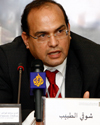 In exploring the revolution from a legal angle, and that of party politics, lawyer and researcher Shawqi al-Tabeeb asserted that Tunisia is a small country with a long history.
In exploring the revolution from a legal angle, and that of party politics, lawyer and researcher Shawqi al-Tabeeb asserted that Tunisia is a small country with a long history.
The central state has been present in Tunisia for three thousand years, since the founding of Carthage, which resulted in an ingrained respect for central authority. This could explain why no revolts were registered against the state for a long period; additionally, Bourguiba had a program to modernize the country despite his despotism, and he invested 30% of the state budget into education, despite being advised against educating the masses.
The speaker claimed that the continuation of injustice and repression pushed the political elites to join unions, which have an abundance of Islamists, Marxists, and liberals, and labor syndicates, and the opposition began playing its role through these organizations.
Despite the fact that the General Labor Union is burdened by bureaucracy, and hosts a section that deals with the regime, another section - predominantly among the middling classes - has preserved its specificity. Furthermore, the lawyer syndicate and the Human Rights Association stood with the protestors, and called for the defense of the demonstrators' rights.
Al-Tabeeb asserted that the protest turned into a full-fledged revolution demanding the ousting of the President, the disbanding of the cabinet, and the promulgation of a new constitution, a revolution without a "revolutionary council" or charismatic leaderships.
The internet and social networks played a key role in the success of the revolt. Following from this al-Tabeeb wondered: do we still need traditional political parties after it became clear that the people can impose its agenda without them?
In the Q&A following the session, some speakers questioned the need for political parties and civil society organizations given the youth's preference for internet social networks. Questions were also posed regarding the role of the private sector in Tunisia and Ben Ali's responsibility for poverty in Sidi Bouzid. A question was raised regarding the role of National Union of Tunisian Students, and whether the Tunisian state could default in a manner similar to Greece.
In their responses, the presenters said that they do not deny the economic achievements that were accomplished in Tunisia due to the efforts of all Tunisians, adding that - had it not been for corruption and despotism - Tunisia's economic level would be comparable to Malaysia and India.
As for the possibility of the collapse of the Tunisian economy, this was affirmed to be a remote possibility, it may be shaken on the short run, but it should achieve greater advances on the long run due to the lack of corruption and predatory practices.
Session 3: Seeking a Democratic Future for Tunisia
The third session was devoted to the question of democracy's future in Tunisia, and was directed by Dr. Muhammad al-Masfir, professor of political science at the University of Qatar.
Mushin Marzuq: We must rebuild the political body
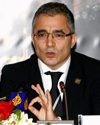 The first presenter was Dr. Muhsin Marzuq, general secretary of "the Arab Institute for Democracy," specialist in the affairs of democratic transition in the Arab Homeland, and founder of the Kawakibi Center for Studies in Tunisia. His talk was centered on the question: Is Tunisia heading towards democracy?
The first presenter was Dr. Muhsin Marzuq, general secretary of "the Arab Institute for Democracy," specialist in the affairs of democratic transition in the Arab Homeland, and founder of the Kawakibi Center for Studies in Tunisia. His talk was centered on the question: Is Tunisia heading towards democracy?
Marzuq considered what went on in Tunisia to be a revolution that transited from social discontentment to reach the political sphere. He also said that this popular movement was distinguished by being more progressive than the formal powers present in the political arena.
He claimed that the present democratic powers have no agendas, and are not prepared for this democratic transformation. Marzuq explained that political failure is apparent in the disunity of political actors and their discords; therefore, there is a need to rebuild the political body in Tunisia.
Marzuq then spoke of the gains that were achieved through the revolt, such as the freedom of the press and the preparations for new legislative elections. He also declared the urgent need for a "document of guarantees" for the current phase, consisting of six or seven basic principles that need to be expressed and presented as a ceiling for everyone in order to inject some confidence into this transitory phase.
Salah al-Deen Al-Jurshi: Popular outpouring with a weak party structure
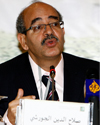 Writer, journalist, expert on Islamic affairs, and director of the al-Jahidh Center in Tunisia, Salah al-Deen al-Jurshi attempted to elucidate the inherent risk in the current Tunisian situation.
Writer, journalist, expert on Islamic affairs, and director of the al-Jahidh Center in Tunisia, Salah al-Deen al-Jurshi attempted to elucidate the inherent risk in the current Tunisian situation.
Through a discussion of the political and parties map, al-Jurshi argued that Tunisia exhibits an activist popular enthusiasm countered by a "weak structure" for political parties. Parties that are, in their majority, incapable of absorbing the current events.
Al-Jurshi highlighted the accumulation of the Tunisian experience leading to the present moment, including the crisis of the left in the 1960s and 1970s, as well as the difficult birth of the Islamic movement in Tunisia, and the consequences of its movement from the experience of religious proselytism into the field of political action.
Contributing to the weakness of the parties was Ben Ali's hegemony over them, and his repression of those that opposed him. Al-Jurshi ended his presentation by stressing the importance of preserving the constitution despite its perceived gaps, and the preservation of the institutions, and the acceptance of a process of political reconciliation.
We should be cautious, he argued, about unchecked popular upsurges, the breakup of the institutions, the interference of the Army, and the degradation of the economy under the crisis.
Mukhtar Al-Aidudi: Legal reforms are a must
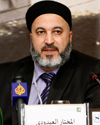 Legal publisher Mukhtar al-Aidudi spoke of the required legal reforms, pointing that a section of them relate to the social sphere, such as the provision of living necessities. He maintained the need to make legislation reforming the labor laws, and others guaranteeing the independence of the judiciary, in addition to the freedom of press and expression.
Legal publisher Mukhtar al-Aidudi spoke of the required legal reforms, pointing that a section of them relate to the social sphere, such as the provision of living necessities. He maintained the need to make legislation reforming the labor laws, and others guaranteeing the independence of the judiciary, in addition to the freedom of press and expression.
He posited that these reforms should be embarked upon in order to endow the Tunisian revolution with a wider frame and create new spaces for it to evolve. This could set the foundation for a regenerative political society capable of taking the revolution towards democracy.
Closing Session: Effects of the Tunisian Revolution on the Arab Homeland
Presiding over the fourth and last session of the symposium "the People's revolution in Tunisia: its causes, results, and effects over the Arab arena," Dr. Azmi Bishara opened by stating the importance of holding a second conference in parallel with the Doha symposium initiated by the Center in Tunis because it would be of more use for scholars researching Tunisia.
The local people, he said, are best suited to express the general situation, and to analyze the flow of events, which are taking a highly accelerated tempo.
The session, which saw the participation of al-Arabi al-Saddiqi, Hasan Bin Hasan, Ezz al-Deen Abd al-Mawla, and Ziad Kreishan, attempted to present a comprehensive assessment of the Tunisian revolt, determine whether it possesses the potential to persist, and spread its germs in other Arab countries.
Al-Arabi al-Saddiqi: The Arab World does not have the reserves required for a process of democratic transition
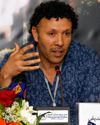 Tunisian professor at the University of Exeter, al-Arabi al-Saddiqi presented a paper entitled "Tunisia's Dialectic and Theories of Democratic Transition".
Tunisian professor at the University of Exeter, al-Arabi al-Saddiqi presented a paper entitled "Tunisia's Dialectic and Theories of Democratic Transition".
The speaker offered a theoretical approach to the problem of democracy in the Arab Homeland that was informed by the events in Tunisia. He elucidated the basic principles of the concept "social transition," and explained the term "democratization," which has gained widespread use these days. He insisted that these concepts are often misused, given the superficial understanding of many social concepts.
Al-Saddiqi focused his effort on defining the concept "revolution," which in his opinion, based on the French school, signifies change. He added that the Tunisian scene presents the scholar with raw data that enables him to conduct deeper and more accurate studies.
He posited that scholars and observers thirst after data coming from within Tunisia, which would help them formulate realistic theories of change, based upon the specificities and local conditions in Tunisia, as well as in the Arab region in general; noting that democracy is the product of the local environment.
Following this theoretical introduction, al-Saddiqi applied these notions to the conference's topic, and the Tunisian revolt by analyzing its specificities, borrowing Ibn Khaldun's concept of Asabiya (esprit de corps), which he characterized as democratic and not exclusive of other Asabiyas.
Al-Saddiqi affirmed the importance of analyzing the Tunisian case from all its angles, which should take place through several avenues, starting with the constitution, given that the Tunisian constitution is one of the oldest in the Arab Homeland, going back to the 19th century.
Secondly, the syndical movement, with Tunisian activists forming the first syndicate in 1902 led by the symbols of Tunisian struggle such as Farhat Hashshad and Habeeb Ashur, can help. He also opined that several challenges face the Tunisians, who hope to protect their gains and prevent their experiment from being aborted, which necessitates benefitting from previous successful experiences, such as Spain's "contractual" experience and South Africa's "reconciliatory" one.
Hasan bin Hasan: Will the revolt spread to the Arabs?
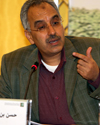 Dr. Hasan bin Hasan, counselor at the Qatar University for Scientific Research, related the latest events in Tunisia to the conditions of other Arab countries, pointing out that Tunisia presents a grand event, possessing a strong dynamic based on the past victories.
Dr. Hasan bin Hasan, counselor at the Qatar University for Scientific Research, related the latest events in Tunisia to the conditions of other Arab countries, pointing out that Tunisia presents a grand event, possessing a strong dynamic based on the past victories.
He added that the event had an inherent force of direction because nobody fully understands the set of grievances that led the revolt, noting that if we apply the standards of social sciences to the Tunisian situation, it becomes clear that social conditions were not the sole motivator of the revolting population.
The researcher denied the notion that Tunisia's events are devoid of deep demands, and can be summed up as a "bread riot," arguing that such a perspective is reductionist given the multifaceted aspects of the revolution, including the achievements of the revolution, as well as the reaction of the elites, and, given that, Arab regimes have seen their legitimacy and potential for facing up to internal challenges seriously degraded.
To this, he added the newfound confidence of the people, who have liberated themselves from historical determinism, become confident regarding their abilities, and discovered their strength, as well as the weakness of the dictator. Such a situation, the speaker described, eliminates the gap between the possible and the impossible.
Bin Hasan hailed the fall of the political model built upon police repression and "wooden language," signaling the birth of a new civil society that will open new possibilities for the future. He added that the media had a decisive role in the victory, which heralds new forms of revolutionary initiatives proving that change is the role of society as a whole, and that all bets on the elites in the Arab Homeland have, so far, failed.
He considered that Arab common problems, such as social misery, in addition to the similarities in historical and political conditions, the unity of culture and a shared Arab political imagery are all elements that facilitate the spread of the revolt from Tunisia to other Arab countries, especially that the people have now succeeded in their aims, and the elite now must follow on the same path.
The elites are required to unify the ranks, and surpass their divisions and squabbles, placing them on a crucial crossroads that will either culminate in democracy or as a simple décor.
Ezz al-Deen Abd al-Mawla: How a protest movement expands into bringing down the regime?
 Ezz al-Deen Abd al-Mawla, specialist in the affairs of the modern media, stressed the role of the media in what took place in Tunisia, arguing that it is not yet time to enumerate the achievements of the revolution, but it remains necessary to acknowledge the strides that it has made on the ground.
Ezz al-Deen Abd al-Mawla, specialist in the affairs of the modern media, stressed the role of the media in what took place in Tunisia, arguing that it is not yet time to enumerate the achievements of the revolution, but it remains necessary to acknowledge the strides that it has made on the ground.
He described the events as a popular revolution, and that any other characterization would be unfair, making it difficult to understand the situation, given that the revolt was not merely a manner of social protests, or a bread riot, but a veritable revolution in every meaning of the word. Al-Mawla stressed that the Tunisian revolution should be classified among the major revolutions, such as the French revolution, the 1917 revolution in Russia, or the Iranian revolution in 1979.
He said that Tunisia's revolt did not have a specific leadership, but that there were numerous leaderships that joined under a collective banner, adding that each revolution has its proper conditions and context, with the specificity of the Tunisian revolution consisting of its occurrence in the age of the media boom.
On this theme, the speaker discussed the modernization approach that played a major role, consisting of the economic development occurring in the country - which was at the heart of the events - with a parallel change in the structure of the state, and a reliance on the role of the elites during the transition phase.
Abd al-Mawla affirmed that the media played an instrumental role, especially the "new media," which broke the previous monopoly and opened new horizons, exposing the state's inability to control the flow of information within its borders. These developments muddied traditional notions of sovereignty, especially that the flow of information can no longer be prevented, or even channeled.
He added, in this regard, that the new media is democratic in the substantive sense since there is an interaction between the emitter and the receiver. To illustrate his point, he used statistics showing the presence of two million Facebook subscribers in Tunisia, which occupies the first rank in the Arab countries relative to population. Furthermore, 70% of the above number represents the 18 to 34 years age group.
Ziad Kreishan: The success of Tunisia's revolution will turn it into a model for Arab countries
Journalist and researcher Ziad Kreishan pointed out - within the same theme - that the Tunisian revolution stands apart from past revolutionary experiences in that it took place in the age of the internet, and would have been difficult to achieve had the context been different.
He pointed at important junctures in the chronology of events, chiefly, the self-immolation of the young al-Bouazizi, with the images reaching everyone at the same moment thanks to the internet, causing a major uproar and producing a generalized sense of shame.
He affirmed that the Tunisian media has gained its freedom now, and is required to play the role of the fair mediator in the coming phase since the success and completion of the Tunisian revolution would constitute a model for other countries to follow.
Azmi Bishara: What occurred in Tunisia could spread to other countries
 In closing remarks to the Tunisia symposium, Dr. Bishara cautioned making grand generalizations regarding the events in Tunisia, especially with some describing the event as a "bread revolution," or a "Facebook revolution," as certain parties are intentionally attempting to underrate the revolution in such a manner.
In closing remarks to the Tunisia symposium, Dr. Bishara cautioned making grand generalizations regarding the events in Tunisia, especially with some describing the event as a "bread revolution," or a "Facebook revolution," as certain parties are intentionally attempting to underrate the revolution in such a manner.
He stressed that social networks had a role that might have been important, but definitely not the main motivator of the Tunisian people, given that the same tools exist elsewhere. What mattered was the interaction of such factors with the Tunisian specificity, he added, warning against "mythologizing things," such as the mythic qualities endowed to social networks - despite their importance.
He affirmed that the debate opened about the Tunisian revolution can be seen as one of the first Arab attempts to understand the happenings in that brotherly country, adding that the Center did not wish to remain inactive, or a passive observer vis-à-vis the events, especially as they were related to the higher causes and issues of freedom.
Furthermore, he stressed that the Center should not be neutral regarding these issues since it is required to be objective, and not to be neutral, as a great difference exists between objectivity and neutrality when it comes to the major causes in the Arab Homeland.
The Arab Center for Research and Policy Studies finds that this is the time for a hasty effort to understand the truths behind the Tunisian revolution, and gain a deeper and more precise understanding for what has happened, as well as what will happen in the future, for we will be incapable of assimilating the different dimensions of the Tunisian revolt without comprehending the background and essential characteristics of the matter. This, Bishara added, should begin by identifying the specificity of the phenomenon.
Upon answering many of these questions, Bishara said, the Tunisians will understand why this has happened at this historical moment. Dr. Bishara considered that what happened in Tunisia could one day spread to other regions because the same root causes exist in more than one place, and Tunisia's revolt may inspire similar uprisings in the future.
Bishara stressed the importance of seeking substantive answers regarding the Tunisian phenomenon in order to do justice to history, and to those who took to the streets to express their anger, especially that no party claims to have led the movement and directed the anger of the crowds, which accomplished the mission.
Despite the fact that the revolt is a popular one that knows no leadership, it should not be isolated from the legacy of organized political and party activism, which has marked the political and cultural life. This fact also does not disqualify political movements from playing their role in the transitional process towards democracy.
He called upon the Tunisian elites to play their full role in the coming phase, and to maintain a level of responsibility that safeguards the nation's welfare, laboring to preserve the gains of the revolution above party interests. He also warned the Tunisian elites against falling into debacles that would jeopardize the gains that have been realized.